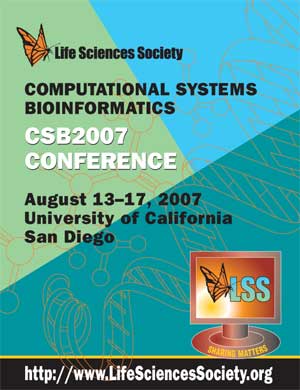MANGO: A New Approach to Multiple Sequence Alignment
Zefeng Zhang, Hao Lin, Ming Li*
David R. Cheriton School of Computer Science, University of Waterloo, Ont. N2L 3G1, Canada. mli@uwaterloo.ca
Proc LSS Comput Syst Bioinform Conf. August, 2007. Vol. 6, p. 237-247. Full-Text PDF
*To whom correspondence should be addressed.

Multiple sequence alignment is a classical and challenging task for biological sequence analysis. The problem is NP-hard. The full dynamic programming takes too much time. The progressive alignment heuristics adopted by most state of the art multiple sequence alignment programs suffer from the 'once a gap, always a gap' phenomenon. Is there a radically new way to do multiple sequence alignment? This paper introduces a novel and orthogonal multiple sequence alignment method, using multiple optimized spaced seeds and new algorithms to handle these seeds efficiently. Our new algorithm processes information of all sequences as a whole, avoiding problems caused by the popular progressive approaches. Because the optimized spaced seeds are provably significantly more sensitive than the consecutive k-mers, the new approach promises to be more accurate and reliable. To validate our new approach, we have implemented MANGO: Multiple Alignment with N Gapped Oligos. Experiments were carried out on large 16S RNA benchmarks showing that MANGO compares favorably, in both accuracy and speed, against state-of-art multiple sequence alignment methods, including ClustalW 1.83, MUSCLE 3.6, MAFFT 5.861, Prob-ConsRNA 1.11, Dialign 2.2.1, DIALIGN-T 0.2.1, T-Coffee 4.85, POA 2.0 and Kalign 2.0. MANGO is available at http://www.bioinfo.org.cn/mango/.
[CSB2007 Conference Home Page]....[CSB2007 Online Proceedings]....[Life Sciences Society Home Page]